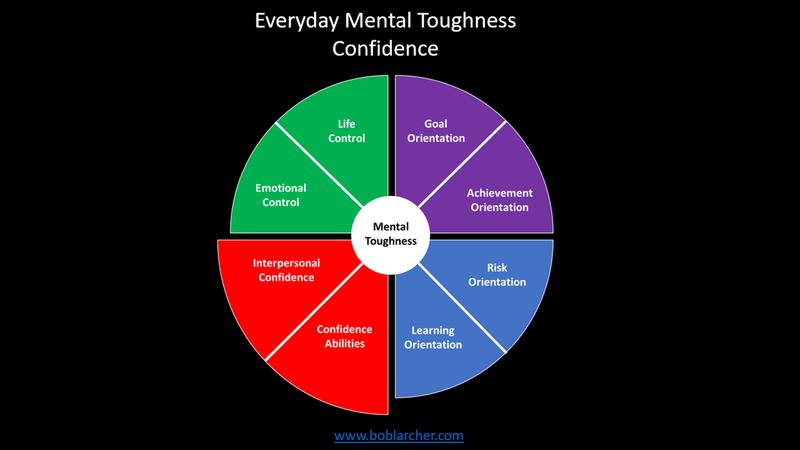Everyday Mental Toughness – Part 4: Confidence
Everyday Mental Toughness – Part 4: Confidence
This is the fourth, and final, of four articles concentrating on how to develop each of the four Mental Toughness “sub-components”
I work with the model developed by Professor Peter Clough and Doug Strycharczyk.
In their model the four sub-components are:
- Control – life control and emotional control
- Commitment – goal orientation and delivery orientation
- Challenge – stretching oneself and learning from everything
- Confidence – interpersonal confidence and confidence in abilities
This article will look at some ideas for developing confidence
Confidence is about “Self-Belief” and describes to what extent you believe you have the ability to deal with what you will face.
There are two components in Confidence – Interpersonal Confidence and Confidence in Abilities.
Interpersonal confidence
Your level of self-belief isn't set in stone, it’s not unalterable; we all have “ups and downs”.
We all have that little “negative inner voice” that tells us that “we are not up to it”, or that “someone else will better at it than me”, or that “it’s not worth saying what I am thinking”, or that “people won’t be interested in my ideas”, etc. It’s a “little” inner voice but it can be quite “loud”; in fact, sometimes so loud that it drowns out that other inner voice that is trying to tell you that, “yes, of course you are up to it” or that, “your idea is well worth presenting and exploring”.
When you start to doubt yourself, you need to take some time to listen to that negative inner voice. Is it really your voice? Or, is it a parent's voice, a teacher’s voice, a collection of lots of different voices from different times and people? Tell yourself: "This is not my true voice!" Then start to challenge it and also to just plain ignore it.
I’m a great fan of the book, “I’m Ok you’re OK”, a gem of a book that was published in the late sixties and that is still pertinent today. The essence of the book is that we are all “ok”; some people may have a different or higher position, different or more knowledge, different or more responsibilities, etc; but that doesn’t make them “more” or “less” ok than us
Many people who lack Interpersonal Confidence (and self-belief) have a strong inclination to put themselves in the “I’m not OK, you’re OK” position.
To get to “I’m ok you are ok” you need to cut down on comparing yourself with others. Comparing yourself to others is a losing battle; no matter how good you are at something; you will always find somebody who is better than you. Thus, a lot of comparing yourself to others will make you feel “they are ok I’m not ok”.
Confidence in abilities
Very few people succeed in business (or elsewhere) without a degree of confidence in what they can do. Yet everyone, from young people in their first real jobs to seasoned leaders in the upper ranks of organizations, have moments — or days, months, or even years — when they are unsure of their ability to tackle challenges. No one is immune to these bouts of insecurity at work, but they don’t have to hold you back.
Tony Schwartz, the president and CEO of The Energy Project and the author of the book Be Excellent at Anything: The Four Keys to Transforming the Way We Work and Live, says that “confidence equals security equals positive emotion equals better performance,”
Overcoming these self-doubts starts with honestly assessing your abilities (and your shortcomings) and then getting comfortable enough to capitalise on (and correct) them
In his book, Schwartz describes what he calls a 4-step virtuous cycle.
Preparation
The best way to build confidence in a given area is to invest energy in it and work hard at it, deliberate practice will almost always trump natural aptitude; once you are good at something, acknowledge to yourself that you are good at it – “I know my subject and I know what I am talking about”.
Get out of your own way
People who are confident in their abilities are willing to acknowledge that, “I know my subject and I know what I am talking about” and they are also willing to acknowledge that “I don’t, and can’t, know everything” - it’s better to know when you need help, than not.
Being good at something is not about self-promotion, in fact, confidence is probably no longer the right word. It becomes more about purpose and the unique perspective you bring to a subject
Get feedback when you need it
While you don’t want to completely rely on others’ opinions to boost your ego, validation can also be very effective in building confidence in your abilities; when you’ve been told ten times that your presentations are great (and why they are great) – maybe it’s time to start believing that you are good at giving presentations.
Take risks
Many people don’t know what they are really capable of until they are truly tested. Although often easier said than done, trying things that you don’t think you can do can be a valuable experience – failure in a relatively safe environment, when the stakes are relatively low, can be very useful for building confidence.
Confidence is more than thinking positive, it’s about acting positive; you have to put it into action. Action is the key to developing self-confidence. It’s one thing to learn to think positive, but when you start acting on it, you change yourself, one action at a time. You are what you do, and if you change what you do, you change what you are.
Be the first to post a message!
